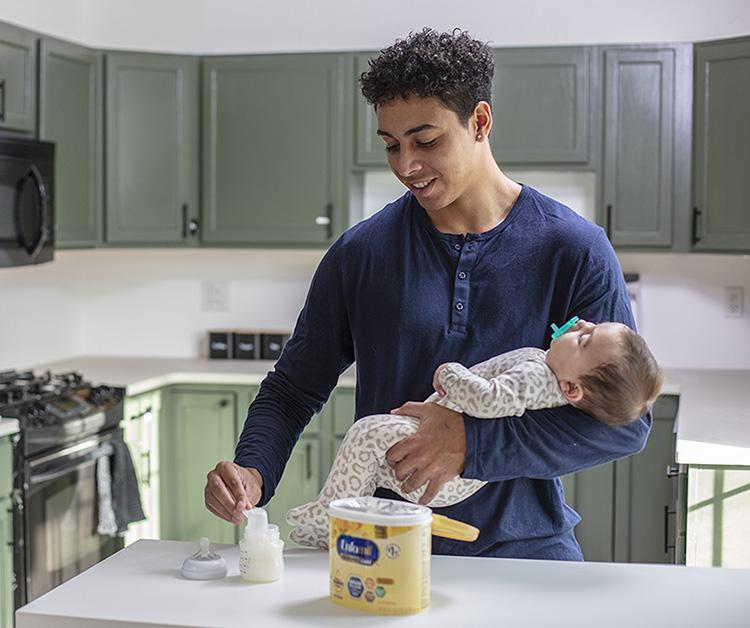Due to maintenance, rewards points for receipt uploads will be delayed. Thank you for your patience!

Navigating formula switches and when to ask your doctor if it’s time for a change.
Every baby is special–even siblings can have very different preferences and needs for baby formula, so it’s perfectly normal to have that conversation with your doctor about a formula that just doesn’t seem to be working. If you decide with the guidance of your doctor to switch formulas, you might notice some changes in your baby's behavior and bodily functions–hopefully for the better!
Many doctors will recommend trying a formula between 3-5 days before deciding to switch. If you’re ever not sure a formula is a good fit for your baby, it can’t hurt to reach out to your doctor for guidance. Depending on what your issues or concerns are, your doctor may come up with a different plan and different timeline.
Every baby is different, and that’s why it’s so important to consult your doctor about switching baby formulas because your doctor is able to make recommendations for your baby’s individual needs.
You can ask your doctor these 5 key questions to help you get clarity about what to expect for your specific circumstances:
One of the most common reasons doctors recommend switching formulas is to address feeding or digestive issues, such as excessive spit-up, gas, constipation or some sort of allergy.
In these cases, you should hope to see relatively fast results. Your doctor can give you the best idea of how long you should try a new formula until it seems to be a better fit for your baby. If the issues persist, check back with your doctor to see if there might be a different root cause, or if it’s time to try another formula.
When you switch to a new formula, it can be normal to notice some changes in poop color, smell, and consistency.
It’s not uncommon for babies to hesitate to try new formula–and while we can’t always know for certain, there are a few things that could explain why your baby might need some encouragement to try the new formula:
We can all be creatures of habit sometimes. If you have a baby that loves routine, it can help to make sure you’re giving them the new formula in the same bottle and during the same feeding times.
Think about how overwhelming it must be for a baby to experience something new every second of every day! Sometimes it just takes time to warm up to new things, especially if your baby has had a busy day. If you can, introduce the new formula at a time when baby is calm and/or hungry.
Sometimes we have involuntary reactions to new foods–if the body isn’t used to it, it might reject it at first. Many doctors recommend introducing the new formula in small doses, mixed with the previous formula so that your baby doesn’t feel such a dramatic switch all at once. Always be sure to get clarity from your doctor about when, how much, and how often to feed your baby.
If your baby has had negative experiences with a previous formula, they might not understand that you’re giving them something different. Try to encourage them by feeding the new formula when they’re hungry and calm. Your enthusiasm and positive energy might also encourage them to feel good about giving the new formula a try.
Sometimes we’re blessed with a baby that has a strong will, and patience goes a long way. Sometimes we just have to hang in there and keep showing that love that we all have for our children, and trust that we’ll figure out what works eventually. You’re not alone–everyone has ups and downs with feeding babies, but just as quickly as someone can remember the difficulties they had feeding their baby, they can tell you just as quickly it was worth it.
Some babies need extra nutrients, and sometimes parents want to get the most nutrition they can from formula. There doesn’t always have to be a problem for a formula switch–if you’re interested in giving your baby additional nutrients not found in other regular formulas, don’t hesitate to ask your doctor about switching to premium formulas that offer those benefits.
Whether you’re considering switching within a brand or from one brand to another, the most important thing to compare are the ingredients of the formula. When considering your options with Enfamil, you can always expect to see high-quality, commitment to safety, and complete nutrition in every one of our formulas.
Enfamil also offers loyalty incentives such as rebates, coupons, and formula discounts for members of Enfamil Family Beginnings. There is no cost to joining or being a member, plus you get exclusive access to tips and promotions that can be helpful in your parenting journey.
Wherever you are in your formula finding journey, Enfamil is here to support you every step of the way. Explore our family of formulas to explore and compare your options with the #1 recommended brand by pediatricians.
Toda la información de Enfamil, incluyendo, pero no limitada a la información sobre la salud, condiciones médicas y nutrición, está destinada a tu conocimiento en general y no substituye la identificación del cuidado médico de un profesional de la salud, consejos o el manejo para condiciones médicas específicas. Debes buscar atención médica y consultar a tu médico o pediatra por cualquier problema específico de salud o nutrición. Nunca ignores el consejo médico profesional ni retrases la búsqueda de tratamiento, atención o ayuda médica debido a la información que hayas leído en Enfamil